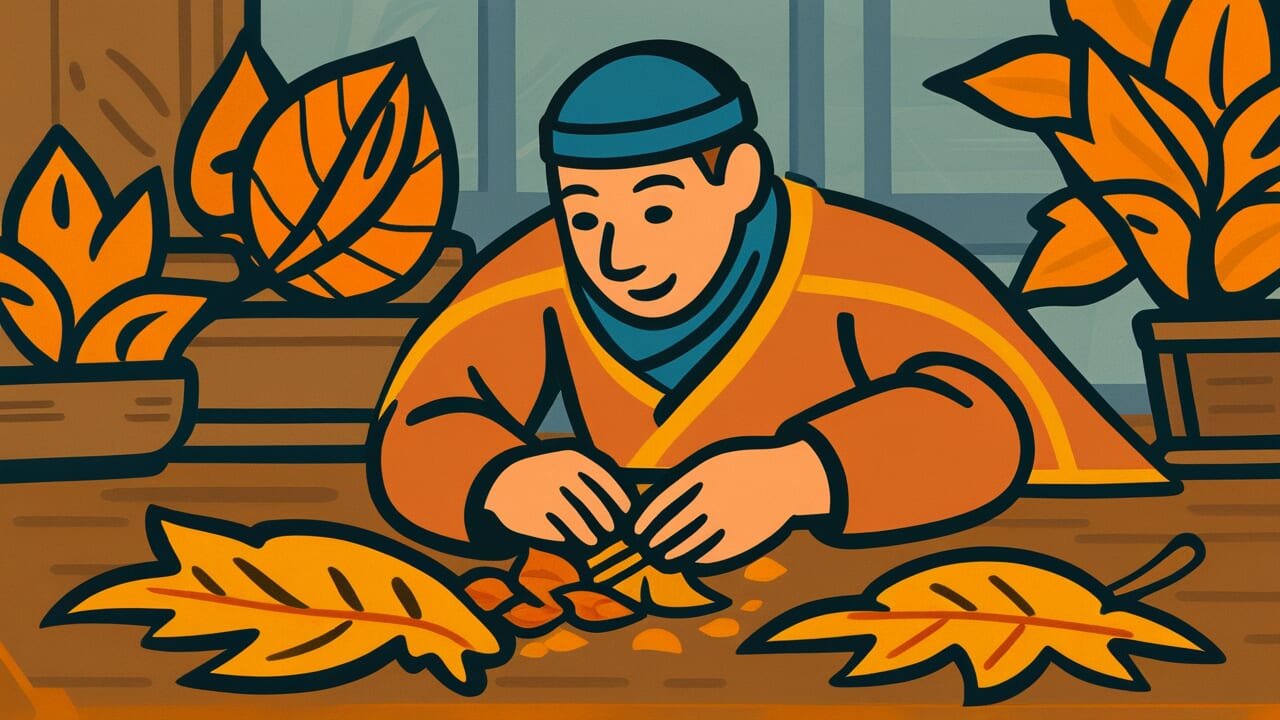How to Read “A merchant decorates even tree leaves as brocade”
Akindo wa konoha mo nishiki ni kazaru
Meaning of “A merchant decorates even tree leaves as brocade”
This proverb means that merchants are really good at making cheap things look valuable. It all depends on how they present and display them.
Even something worthless like tree leaves can look as attractive as expensive brocade silk. This shows how skilled merchants are at selling things.
People use this saying when they watch business deals or markets. They also use it when they see a clever salesperson at work.
It points out that how you show something matters more than the thing itself. How you talk about it is just as important.
Today, we understand this as marketing and presentation skills. It’s not just about the product’s real value.
Package design, advertising, and branding all matter too. These are all ways to make something look more valuable.
Origin and Etymology
We don’t know exactly when this proverb first appeared in writing. But it probably came from the Edo period’s business culture.
Edo was one of the world’s biggest commercial cities. Many merchants competed with each other using clever ideas and skills.
The contrast between “tree leaves” and “brocade” is the key to this proverb. Tree leaves are worthless things anyone can find.
Brocade is expensive, beautiful silk fabric. This extreme contrast shows how skilled merchants really are.
Edo period merchants didn’t just line up products and sell them. They paid attention to how things looked, packaging, and even store design.
They thought about everything. The color of shop curtains, how to display products, what wrapping paper to use. All these things made products seem more valuable.
Cloth merchants and medicine sellers were especially good at this. They really knew how to show off their products.
The word “decorates” is important too. It doesn’t just mean decoration. It means all the skills used to bring out a product’s best qualities.
This includes how you light things, how you explain them, and even how you treat customers. It means the total power of presentation.
This proverb was born to praise this skill. Creating value was like a craftsman’s art for merchants.
Interesting Facts
Edo period merchants used a concept called “mitate” in their business. This was an aesthetic idea from tea ceremony culture.
In tea ceremony, people enjoyed treating cheap tools as if they were expensive masterpieces. This influenced how merchants presented their products.
Brocade has always been a luxury item. Only high-ranking people could wear it in ancient times.
In the Heian period, weavers who made brocade were special craftsmen serving the imperial court. Its beauty symbolized power and wealth.
Usage Examples
- That store really shows that a merchant decorates even tree leaves as brocade. They make ordinary vegetables look like luxury items with their displays.
- When I look at online shopping photos, I’m impressed. A merchant decorates even tree leaves as brocade is so true.
Universal Wisdom
This proverb has been passed down because it reveals a universal truth. How we see things depends more on presentation than reality.
We think we judge things objectively. But actually, context, presentation, and first impressions strongly influence us.
Merchants learned this truth about human psychology through experience. The same product can seem to have completely different value.
It depends on lighting, placement, and the words used to describe it. This happens because our brains process information as a whole story.
What’s interesting is that this proverb doesn’t criticize merchants. Instead, it recognizes their skill as a kind of craftsmanship.
The ability to create and present value isn’t just trickery. It’s a highly advanced skill.
In fact, much of the value in our lives comes from meaning and stories. It’s not just about objective function.
Food tastes better when eaten from beautiful dishes. Presentation has the power to change the quality of our experience.
Our ancestors expressed this deep insight through merchants’ skills. They understood that “value is created through presentation.”
When AI Hears This
A tree leaf itself contains very little information. It’s just part of a plant, green, and light. That’s about it.
But when a merchant “decorates it as brocade,” what happens? In information theory, the physical properties don’t change. But the quality and amount of information the receiver gets changes dramatically.
This is information transformation through “context injection.” The same tree leaf has almost zero information value lying on the street.
But add the story “a special leaf picked at a famous autumn spot in Kyoto.” Now multiple information layers activate in the receiver’s brain at once.
These include season, place, rarity, and aesthetic value. In information theory, unexpected information has higher value. Combining an ordinary leaf with “unexpected context” makes its information entropy jump.
What’s more interesting is that merchants create “interpretation frames,” not physical objects. Package design, product names, and display methods are all meta-information.
They send instructions to the receiver’s brain about “how to process this information.” The same bit sequence can mean completely different things with different keys.
A merchant’s skill isn’t about changing information content. It’s about manipulating the cognitive filters of the person receiving the information.
Lessons for Today
This proverb teaches modern people about the power of presentation. You might have great ideas or products.
But if you can’t communicate them effectively, people won’t recognize their value. On the other hand, good presentation helps you deliver your true value to others.
This isn’t about deceiving people. It’s about organizing information in an easy-to-understand way. It’s about bringing out maximum appeal. This is the essence of communication.
Job interviews, project presentations, social media posts—modern society requires everyone to “present” themselves and their work.
The important thing is balancing presentation with honesty. Merchants need real product quality, not just good presentation, to stay in business long-term.
You should polish your skills to express your real value in its most brilliant form. This is an essential skill for living in the modern world.



Comments